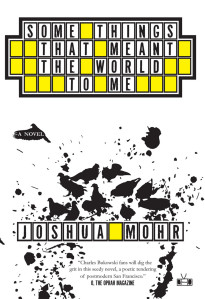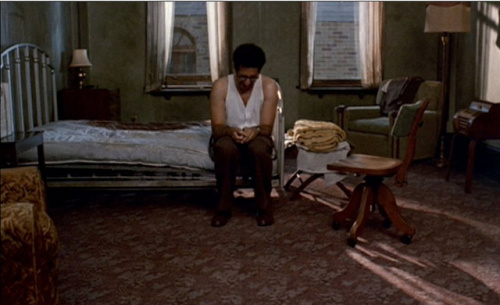Matt Bell
Denis Johnson’s Jesus’ Son famously ends with the lines,
“All those weirdos, and me getting a little better every day right in
the midst of them. I had never known, never even imagined for a
heartbeat, that there might be a place for people like us.” And it
sounds so redemptive after all the misery and confusion that has come
before, and because we are given no more access to our narrator’s future
it is easy to read it in such a way—that is, after all, how we mostly
expect books to end. (Certainly the makers of the film version of Jesus’ Son
made this mistake, amid others, because their script rewrote Johnson’s
ambiguous and disjointed masterpiece into a cheaper and more-linear
junkie-love redemption story.) But what Denis Johnson seems to actually
offer isn’t a kind of false (or, at best, merely narrative) redemption,
but something else—and in my opinion something better than just another
salvation story, the default mode of most of our popular narratives in
books and movies.
“Beverly Home” is the last story in Jesus’ Son, and it
begins with our nameless narrator describing a probably-married woman he
meets working at a nursery, who invites him to come back and see her
again. He knows he won’t go back, but not because she’s married—it’s
because she “seemed much too grown-up” for him. He goes on to talk about
how in those days he “was a whimpering dog inside, nothing more than
that”:
I looked for work because people seemed to believe I
should look for work, and when I found a job I believed I was happy
about it because these same people—counselors and Narcotics Anonymous
members and such—seemed to think a job was a happy thing.
The narrator—seemingly still in fairly bad shape, even if he is
sober—then describes at some length this job working at the titular
Beverly Home, a hospital for the old and the infirm and also those who
were “fine,” except they “couldn’t be allowed out on the street with
their impossible deformities” that made “God look like a senseless
maniac.” Describing one patient, our narrator almost gleefully says, “No
more pretending for him! He was completely and openly a mess. Meanwhile
the rest of us go on trying to fool each other.” Of another, he says,
“It wasn’t his physical condition that kept him here, but his
sadness”—and given the number of times variants on the word “sadness”
appear in this story, it is impossible for this observation to not also
reflect back upon our narrator, whose problems in this time are more
spiritual or psychological than physical, more of the past than of the
future.
Tellingly, in a story that uses four fragmentary, non-linear bits of
narrative to start its movement, Johnson segues out of the first long
passage describing Beverly Home and into the next part of the story
without such a break: He moves uninterrupted from the “magisterial
sadness” of that last patient to his narrator’s replacement addiction, a
home in east Phoenix where he stands on tiptoe to watch a
possibly-Mennonite woman sing in the shower, singing “with the
unconsciousness, the obliviousness, of a castaway,” suggesting that this
experience outside of Beverly Home also fits among the descriptions of
the deformities within it. Here we also see a perfect example of the way
that Johnson takes the transcendence of this already-questionable
moment—the narrator feels “weightless” while peeping, hovering there
with his chin about the windowsill—and undercuts it with the narrator’s
criminal thoughts:
She toweled off quickly, briskly, never touching herself
in any indulgent or particularly sensual way. That was disappointing.
But it was virginal and exciting, too. I had thoughts of breaking
through the glass and raping her. But I would have been ashamed to have
her see me. I thought I might be able to do something like that if I
were wearing a mask.
Later the narrator tells us about dating a woman he describes as a
“dwarf,” saying that the television always played when they made love,
because he “was afraid to make love to her without the conversation and
laughter from that false universe playing in our ears”: “I didn’t want
to get to know her very well, and didn’t want to be bridging any
silences with our eyes.”
And yet, despite these many flaws and character defects, one of the great accomplishments of Jesus’ Son is
the ways in which we are made to love this nameless narrator, in all
his monstrous beauty: He is funny and charming and (I imagine)
good-looking in a certain kind of way, and in his speech he is capable
of gorgeous turns of phrase and seemingly-deep insights—even if those
insights rarely better his life, in the way we sometimes hope insight
might.
In the end, I believe we know too much of who he really is (or at
least who he has been) to love this narrator in any way but by loving
him as a junkie first: by loving him even while accepting that he is
likely going to backslide, that despite his moments of overwhelming
honesty he is sometimes lying to us, that he is likely to disappoint us
again and again. Even if our narrator never uses drugs again that will
not stop him from being a junkie in other ways. There is no fundamental
change being offered here that will completely shift the balance in his
personality: through most of the book he is truly cruel in his
interactions with others (he holds a mother to her apartment floor at
gunpoint; he does handfuls of pills while working in an emergency room;
he lies about getting a vasectomy to his girlfriend on the way to
getting an abortion, telling her that her unborn child belongs to
someone else; he punches another girlfriend in the stomach outside a
motel), and there is nothing to suggest that the worst of this sort of
behavior has ended completely. Rather it seems more likely that it has
merely receded, even from his perspective: While watching the Mennonite
woman through her window—something he does so often that he frequently
misses his bus home—he says, “How could I do it, how could a person go
that low? And I understand your question, to which I reply, Are you
kidding. That’s nothing. I’d been much lower than that. And I expected
to see myself do worse.”
So if not redemption, then what are we offered there at the end, in
those famous last lines, and what does the narrator find at Beverly
Home? Shortly before the end, he tells us, “I felt about the circular
hallway of Beverly Home as about the place where, between our lives on
this earth, we go back to mingle with other souls waiting to be born.”
This isn’t an image of redemption—it’s not heaven—but of a kind of
near-reincarnation, and as such it has a different connotation: The
narrator isn’t imagining that he might be saved, but that he might have a
chance to try again. Beverly Home has become the place just before
life, a place where he imagines he is “waiting to be born” (note, not
“reborn”), a chance perhaps not even to start again—but rather at last
to start from. He hasn’t actually started yet, perhaps never
will, but there is a kind of hope here, and in a world as difficult as
ours—and with our own actions and thoughts often revealing us to also be
some variety of beautiful monster, as Johnson’s narrator’s actions and
thoughts so often do—hope might be all we can reasonably expect. It is
thanks to Johnson’s great restraint that Jesus’ Son ends not in
the fulfillment of that hope, but merely in the presence of its
promise, held there in “that place for people like us.” “I was getting
my looks back,” our narrator says, “and my spirits were rising, and this
was all in all a happy time for me”—and we might presume that this
valuation includes his weaknesses too, his bad behaviors and
backslidings. And yet in the presence of his worst qualities, still some
happiness, still some hope. It’s more than some of us ever get. It’s
more than enough.
Matt Bell is the author of Cataclysm Baby, a novella, and How They Were Found, a collection of fiction. His stories have been selected for Best American Mystery Stories 2010 and Best American Fantasy 2. He is the Senior Editor at Dzanc Books, where he also runs the literary magazine The Collagist, and in the fall he will join the creative writing faculty at Northern Michigan University.



